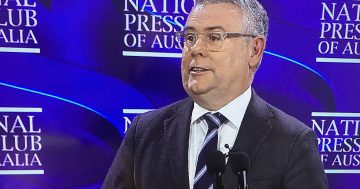
No federal government has dared to improve Australia’s outdated environmental protection laws, but the new Environment Minister says it’s now in train. Photo: File.
Australia’s environmental protection laws will be overhauled within 18 months, if the federal minister responsible is to be taken at his word.
The reforms won’t just be framed by the need to protect biodiversity and Indigenous heritage, however, but also to meet government priorities of improving productivity and lifting the nation’s economic prosperity.
In the meantime, consensus on what should be written into the new laws is proving as difficult as ever to reach.
Environment Minister Murray Watt held what he described as a “high-level meeting of key stakeholders” in Canberra on Thursday (19 June), and emerged saying progress on housing, clean energy and productivity were all dependent on improved environment laws.
“Obviously these laws are vital for protecting our precious environment, which is a major cultural and economic contributor to our country,” the Minister said.
“But it is also incredibly important that we get these laws working to achieve other national priorities, like improving productivity and delivering the homes, jobs, clean energy and economic prosperity our country needs in the future.
“This process offers a massive opportunity to drive long-lasting change that benefits our natural environment and all Australians.
“That’s why it is my intention to deliver these reforms within the next 18 months.”
The roundtable brought together leaders from across the environmental, resources, energy, climate, housing and agricultural sectors, as well as First Nations representatives.
Senator Watt said the group supported the reforms to Australia’s environmental laws being based on the three pillars of stronger environmental protection and restoration; more efficient and robust project assessments; and greater accountability and transparency in decision-making.
According to the Minister, those at the meeting also showed strong support for key components of the reforms needing to include: national environmental standards; streamlined approval processes; regional planning; more robust offsets regimes; and better data on environmental impacts.
The Minister conceded there were serious points of difference expressed during the meeting and it closed with the understanding “there is much work left to do”.
But he said there was plenty of goodwill and agreement between stakeholders.
“Everyone agrees that our current laws are broken,” he said.
“They are not working for the environment, and they are not working for business.
“Many groups shared that they were prepared to give and take, knowing there will need to be some compromise to achieve the broader outcomes.
“It’s vital these groups continue working together, as well as with the government to deliver these much-needed reforms.
“Reforming our environmental laws is not just a job for government and there is an opportunity for all involved to be part of the solution.”
Mr Watt said it was in the national interest for the laws to pass parliament in the first half of this term.
The Greens say 18 months is a long time away and the Minister should commit to not approving any new polluting projects until the legislation is tabled.
Australia’s Environment Protection and Biodiversity Conservation (EPBC) Act was written in 1999 with little having been updated since then.
The Graeme Samuel review in 2020 declared the EPBC Act to be outdated and that Australia’s natural environment was in decline because of it.
But no government has succeeded in framing new laws to improve the nation’s environmental laws.
High on the list of disagreements is whether new laws should include a mechanism to allow the rejection of projects based on their impact on climate change.
The resources sector is against it, while conservationists are insisting on it.
That point seems to be the major stumbling block and reason why successive governments have not been able to progress changes to the environmental protection laws.
The current EPBC Act does not factor climate change and carbon emissions into the project applications process.
Senator Watt is not in favour of a so-called “climate trigger” being written into the new laws but says he won’t rule anything in or out at this stage as he wants to remain open-minded while the stakeholder consultation process plays out.
The Climate Council says climate change consideration must be included in the new Act one way or another if the law is to be fixed.
Senator Watt remains under heavy criticism over his decision last month to approve the extension of Woodside Energy’s North West Shelf gas project until 2070.
Original Article published by Chris Johnson on Region Canberra.









